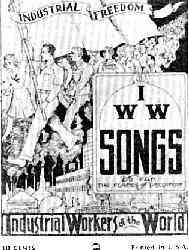


The singingest union America ever had was the old Wobblies. Their official name was the Industrial Workers of the World, started in Chicago in June of 1905 by Big Bill Haywood of the Western Federation of Miners, and others who were dissatisfied with the lack of progress of the little old craft unions under Sam Gompers' American Federation of Labor....They were a defiantly radical group, mostly anarchist-syndicalists of a sort, and they argued bitterly with socialists as to the value of trying to elect working-class congressmen. Their idea was to ultimately sign up all the workers in One Big Union, improve their conditions, and eventually call a general strike to decide who was going to run the world -- the workers or the bosses.
With every union card, they also handed out a little red songbook. The cover carried a motto: "To Fan the Flames of Discontent." Inside were the words to about fifty songs, usually parodies of well-known melodies -- pop songs of the day, hymns, or older tunes commonly sung....
The songs were roared out by Wobblies at meetings, on picket lines, in jails (where IWW men were often put by the dozens and hundreds), on freight trains through South Dakota (filled with migrant harvest hands for the wheat fields), or wherever Wobblies happened to meet. If the Salvation Army was preaching against them from one street corner, they might set up a soapbox on the opposite corner. When the Salvation Army band started up "In the Sweet Bye and Bye," Wobblies would use it to accompany their own singing of Joe Hill's parody, "Pie in the Sky"....
The working class and the employing class have nothing in common. There can be no peace so long as hunger and want are found among millions of working people and the few, who make up the employing class, have all the good things in life.
The IWW used songs to organize. They had fine poets -- Joe Hill, Ralph Chaplin, Harry McClintock, T-Bone Slim, and others -- turning out songs and parodies like "Solidarity Forever,", "Pie In The Sky," Casey Jones," "Hallelujah, I'm A Bum," "The Rebel Girl," and a thousand more, some terrifically stirring, some stiff and rhetorical, but always aimed to sharpen the class struggle.



